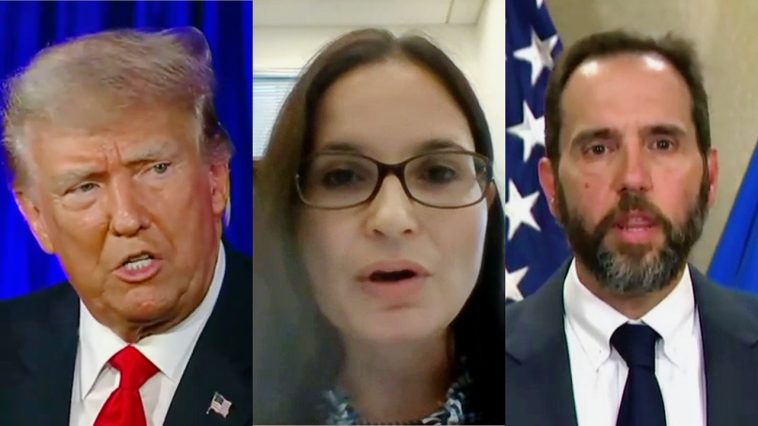Earlier this week, Federal Judge Aileen Cannon, presiding over a classified documents case concerning Ex-President Donald Trump, delivered another blow to the prosecution led by special counsel Jack Smith. The request to prevent defense attorneys from gaining access to certain documents during the discovery period was flatly dismissed by Judge Cannon.
In her ruling, the judge expressed disappointment over Smith’s team’s endeavour to limit discovery, deeming it an ‘atextual and blithe’ understanding of the relevant federal law and ‘a broad and unconvincing theory’.
The dispute arose following Smith’s allegations against Walt Nauta, Trump’s former valet, and Mar-a-Lago property manager Carlos De Oliveira. They were accused of colluding with Trump in illegally retaining classified documents at his South Florida residence. However, Judge Cannon disagreed with the line of reasoning put forth by the Office of Special Counsel in her latest ruling.
Judge Cannon, in her ruling, critiqued the Office of Special Counsel’s overly-expansive interpretation of the Classified Information Procedures Act. She emphasized that their interpretation fell out of sync with a straightforward reading of the law.
Smith’s team’s idea of excluding defendants Nauta and De Oliveira from examining the classified discovery to be presented in the case and then asking the defense counsel to justify their participation did not sit well with the judge.
The request by Smith’s team cited Section 3 of the CIPA law: ‘Upon motion of the United States, the court shall issue an order to protect against the disclosure of any classified information disclosed by the United States to any defendant in any criminal case in a district court of the United States.’
However, according to Judge Cannon, a direct analysis of the law does not support their case. The position that defense attorneys should be across-the-board restrained from reviewing documents to be used as evidence at trial was dismissed.
Judge Cannon pointed out a meaningful difference the CIPA statute makes between the defendants themselves and their legal defenders.
The Office of Special Counsel’s viewpoint implies that although Section 3 refers to ‘defendant’ and despite that the Congress pointedly referred to ‘any attorney of the defendant’ distinct from ‘the defendant’ in CIPA § 2, the term ‘the defendant’ in Section 3 should now mean ‘attorney for the defendant’ — a move that effectively excludes ‘the defendant’ facing charges, especially in cases where the government raises objections to any pretrial disclosures.
The Judge didn’t hesitate to term the special counsel’s stance as a ‘broad and atextual interpretation’ of the statute. She further clarified how the prosecutors must approach should they continue with their attempts to limit the defense attorneys’ access to classified documents.
Cannon advised the prosecution team that they need to operate on a document-by-document basis if they persist in their efforts to restrict defense attorneys’ access to classified information. She cited Section 4 of the CIPA statute which, in part, reads: ‘The court, ‘upon a sufficient showing,’ [may] authorize the United States to delete specified items of classified information from documents to be made available to the defendant through discovery.’
The ‘broad and unconvincing theory’ by the Office of Special Counsel did little to sway Judge Cannon’s stance. She insisted that ‘the Court must change the meaning of the word ‘defendant’ to mean, essentially, ‘defense attorney to the exclusion of defendant.’ The Court declines to do so,’ Cannon wrote.
She further adds, ‘In the end, whatever the contours of the OSC’s broad theory prohibiting a defendant’s access to discoverable information, the answer is not to change the natural meaning of a statutory word in Section 3 but rather to use the mechanism provided in CIPA to handle matters related to restricting discovery, which in the case of CIPA is Section 4.’
Judge Cannon not only ensured the defendants’ rights were protected, but she also upheld the integrity of the legal process and ensured a balanced approach to the interpretation of the law. She signaled that she wouldn’t allow a broad reading of the law that could potentially undermine the defendant’s right to a fair trial.
She emphasized that the government must use existing legal mechanisms thoughtfully and judiciously. It is not the Court’s duty to change words’ natural meanings but rather to uphold the law as stated and ensure all parties adhere to the legislation’s spirit, even if it means ticking off some potentially cumbersome boxes.
In another interesting twist, on Wednesday, the judge suggested that Trump’s trial might be delayed beyond the 2024 elections. According to current scheduling, it’s set to begin on May 20, 2024. ‘I’m just having a hard time seeing how realistically this work can be accomplished in this compressed period of time, given the realities that we’re facing,’ Judge Cannon said during a hearing.
All in all, the path towards these legal proceedings seems to be more winding and nuanced than initially anticipated. Time constraints and the careful navigation of the law could potentially push this trial into unchartered timelines, adding another layer of complexity to this already intricate case.



